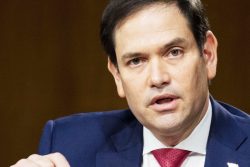In their recent book “How Democracies Die”, Steven Levitsky and Daniel Ziblatt, cite a telling remark from the campaign that brought Hugo Chávez – a political outsider who promised to humble a corrupt elite and deliver a more “authentic” democracy – into office. On the night of his victory, a supporter in Chávez’s home state told a reporter: “Democracy is infected. And Chávez is the only antibiotic we have.”
Ziblatt and Levitsky note that this sympathy for Chávez lasted for more than a decade, even as he stalled a referendum that could have ended his presidency, stacked the Supreme Court, blacklisted critics, closed a TV station and arrested and exiled opposition figures, judges, and members of the media. When Venezuelans were asked, in 2011, to rate their country’s democracy from 1 to 10, remarkably, 51 percent of the respondents rated it 8 or higher.
In healthier democracies, alternative cures appear much earlier. Earlier this week, for instance, Florida senator Marco Rubio attended a town hall event that was broadcast live on CNN. In the wake of the Parkland shooting, grieving students, teachers and families had the chance to hold Rubio – whom the National Rifle Association (NRA) rates A-plus – accountable for the millions in donations that he has accepted from the gun lobby. From the main stage, Cameron Kasky, leader of a student group set up in response to the shooting, asked Rubio if he was willing to say “right now that you will not accept a single [future] donation from the NRA?” Rubio dodged the question but Kasky pressed him, repeatedly. With mounting embarrassment, Rubio politely refused to say that he would not, arguing instead that “the influence of these groups comes not from money [but] from the millions of people that agree with the agenda” – as though the hundreds of grief-stricken people around him belonged to some other polity.
Earlier this week, Emma Gonzalez, a senior at Marjory Stoneman Douglas High School, also caused a stir when she addressed a gun control rally in Fort Lauderdale. In a searing speech Gonzalez mentioned a Trump tweet which noted that the shooter was “mentally disturbed” and added the admonition: “Must always report such instances to authorities again and again.” With rising anger, Gonzalez responded: “We did, time and time again. Since he was in middle school, it was no surprise to anyone who knew him to hear that he was the shooter.” She then spoke about the 30 million dollars Trump had accepted from the NRA and pointed out that it amounted to roughly $5,800 per US gunshot victim in the first six weeks of 2018. “If you don’t do anything to prevent this from continuing to occur,” she warned, “that number of gunshot victims will go up and the number that they are worth will go down. And we will be worthless to you.”
With the crowd chanting “Throw them out”, Gonzalez’s speech ended with these lines: “They say tougher guns laws do not decrease gun violence. We call BS. They say a good guy with a gun stops a bad guy with a gun. We call BS. They say guns are just tools like knives and are as dangerous as cars. We call BS. They say no laws could have prevented the hundreds of senseless tragedies that have occurred. We call BS. … If you agree, register to vote. Contact your local congresspeople. Give them a piece of your mind.” As one pundit wryly observed, Gonzalez is not yet old enough to swear unselfconsciously, but she can still buy an AR-15 in the state of Florida.
Incidents like these are hardly the first indicators of the changing political climate in America, but they are straws in a wind that President Trump should take note of. He entered the White House on a wave of populist anger, branded as a champion of the underdog. This week, however, he seems hopelessly out of touch with the public. He was widely ridiculed after a photograph showed him clutching a sheet of handwritten talking points before a meeting with the victims’ families. Then the New York Daily News published a withering front page headline (“May I play thru?) which showed him in Florida, smiling on a golf course, while the victims of the Parkland massacre were being buried a few miles away.
Despite multiple setbacks, democracy in countries like the US survives because its public sphere eventually defeats private interests. It may take years, but even the lavishly-funded lobbies of the automobile and tobacco industries have to yield in the court of public opinion. After the Parkdale shooting, America’s profound frustration with the gun lobby has been articulated by ordinary people –parents and students – whose anger has resonated deeply within the country. Sen. Rubio and the NRA may appeal to the old playbook – misdirection, false analogies and second amendment absolutism – but it isn’t working like it used to. Two days ago, the world’s largest asset manager, BlackRock, announced that it would soon be meeting with gun companies to “understand their response” to the public’s concerns. It is a modest beginning, especially after years of neglect on gun reform, but it is a hopeful sign that Americans still believe in more than one cure for whatever ails their democracy.









